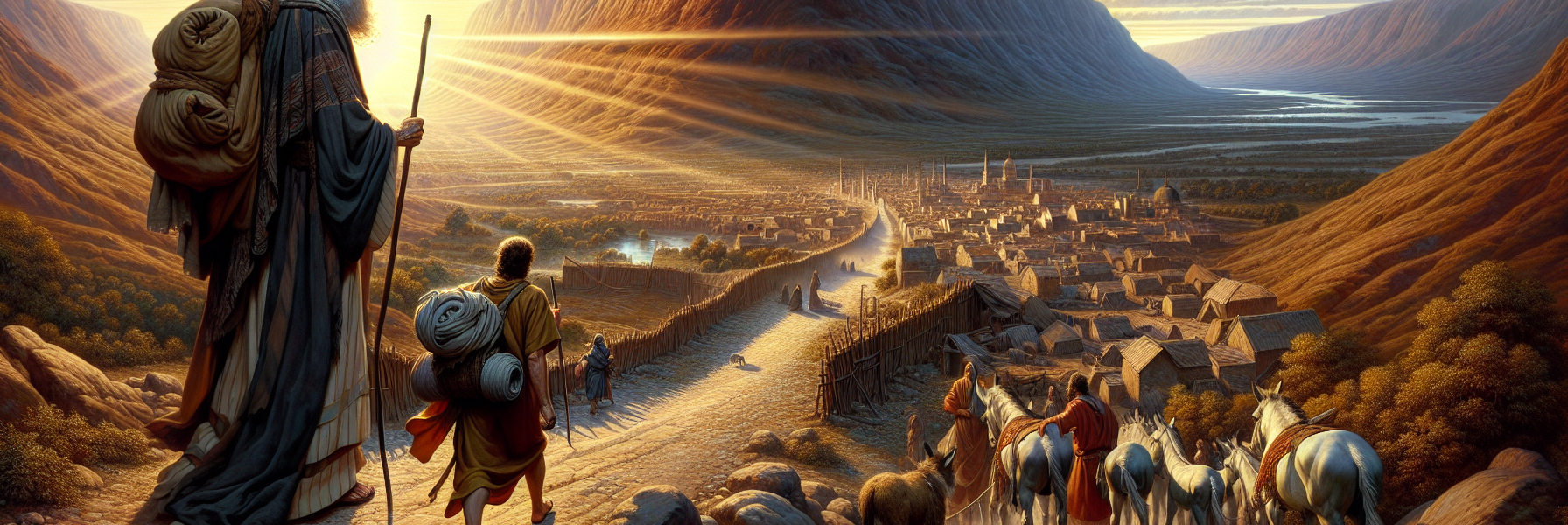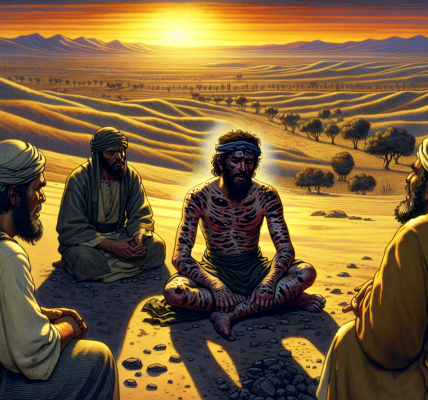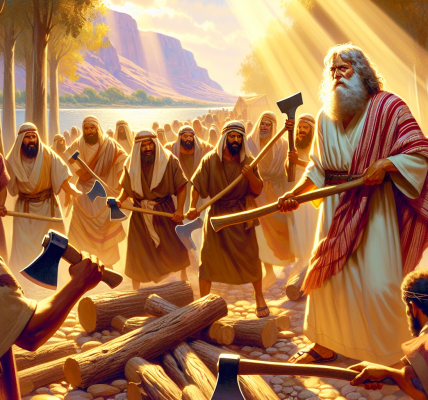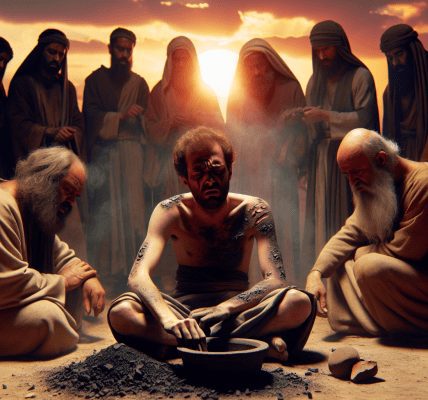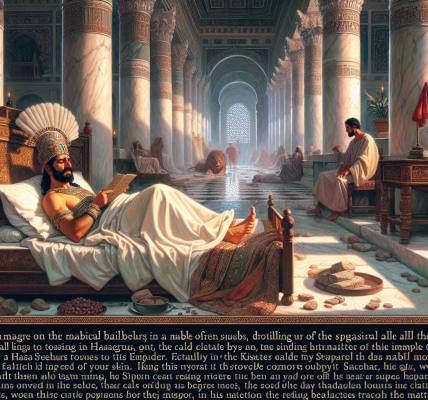**The Anointing of Saul: A King for Israel**
The sun hung low over the hills of Ramah, casting long shadows across the rugged terrain as Samuel, the aged prophet of Israel, made his way toward the small town of Zuph. His heart was heavy with the burden of the Lord’s word, for the people of Israel had demanded a king to rule over them, rejecting the Lord’s direct governance. Though Samuel had warned them of the consequences, the Lord had granted their request. Now, the time had come to anoint the man chosen by God to lead His people.
Meanwhile, in the land of Benjamin, a tall and handsome young man named Saul, the son of Kish, was searching for his father’s lost donkeys. For three days, he and his servant had scoured the hills and valleys, but the animals were nowhere to be found. Frustrated and weary, Saul turned to his servant and said, *”Come, let us return home before my father stops worrying about the donkeys and starts worrying about us.”*
But the servant, a wise and thoughtful man, replied, *”Look, in this city there is a man of God who is highly respected. Everything he says comes true. Let us go there now. Perhaps he can tell us the way we should go.”*
Saul hesitated. He had no gift to offer the prophet, only a few scraps of bread. Yet, the servant reassured him, pulling a small silver coin from his pouch. *”Here, I have a little silver. We can give it to the man of God so he will tell us about our journey.”*
With a reluctant nod, Saul agreed, and the two set off toward the town where Samuel was staying.
### The Divine Appointment
As they entered the city gates, Samuel was just coming out to meet them, for the Lord had spoken to him the day before: *”About this time tomorrow, I will send you a man from the land of Benjamin. Anoint him ruler over my people Israel; he will deliver them from the hand of the Philistines. I have looked on my people, for their cry has reached me.”*
When Samuel saw Saul, the Lord said to him, *”This is the man I spoke to you about; he will govern my people.”*
Saul, unaware of the divine plan, approached Samuel and asked, *”Would you please tell me where the seer’s house is?”*
Samuel smiled knowingly. *”I am the seer,”* he replied. *”Go up ahead of me to the high place, for today you are to eat with me. In the morning, I will send you on your way and will tell you all that is in your heart. As for the donkeys you lost three days ago, do not worry about them; they have been found.”*
Saul’s eyes widened in astonishment. *”But why do you say such a thing to me? I am only a Benjamite, from the smallest tribe of Israel, and my clan is the least of all the clans of Benjamin!”*
Samuel did not answer immediately. Instead, he led Saul and his servant to the feast, where he had prepared a place of honor for Saul at the head of the table, among thirty invited guests. The choicest portion of meat, reserved for the guest of honor, was set before Saul.
That evening, they feasted and talked, but Saul’s mind was troubled. What did all this mean?
### The Anointing
The next morning, Samuel rose early and walked with Saul to the edge of the city. As they stood alone in the quiet dawn, Samuel took out a flask of sacred oil. He poured it over Saul’s head, kissed him, and said, *”Has not the Lord anointed you ruler over his inheritance?”*
Saul’s heart pounded as the oil dripped down his brow. The weight of the moment pressed upon him—he, a simple farmer’s son, had been chosen by God to lead Israel.
Samuel continued, *”When you leave me today, you will meet two men near Rachel’s tomb at Zelzah. They will say to you, ‘The donkeys you set out to look for have been found. And now your father has stopped thinking about them and is worried about you, saying, ‘What shall I do about my son?’*
*”Then you will go on from there until you reach the great tree of Tabor. Three men going up to worship God at Bethel will meet you there. One will be carrying three young goats, another three loaves of bread, and another a skin of wine. They will greet you and offer you two loaves of bread, which you will accept from them.*
*”After that, you will come to Gibeah of God, where there is a Philistine outpost. As you approach the town, you will meet a procession of prophets coming down from the high place with lyres, timbrels, pipes, and harps being played before them, and they will be prophesying. The Spirit of the Lord will come powerfully upon you, and you will prophesy with them; and you will be changed into a different person.”*
Samuel placed his hands on Saul’s shoulders. *”Once these signs are fulfilled, do whatever your hand finds to do, for God is with you.”*
### The Transformation
As Saul turned to leave, everything happened just as Samuel had foretold. The two men near Rachel’s tomb confirmed the donkeys had been found. The three travelers at Tabor gave him bread. And when he reached Gibeah, a band of prophets descended from the high place, caught up in ecstatic praise.
Suddenly, the Spirit of the Lord rushed upon Saul, and he too began to prophesy among them. Those who knew him were astonished. *”What has happened to the son of Kish?”* they asked. *”Is Saul also among the prophets?”*
From that day forward, Saul was a changed man. The quiet farmer had been transformed by the hand of God, filled with a new courage and purpose. Yet, when his uncle questioned him about his encounter with Samuel, Saul spoke only of the donkeys and said nothing of the kingship.
### The Public Selection
Later, Samuel summoned all Israel to Mizpah. The people gathered in anticipation as the prophet declared, *”This is what the Lord, the God of Israel, says: ‘I brought Israel up out of Egypt, and I delivered you from the power of all the kingdoms that oppressed you.’ But you have now rejected your God, who saves you out of all your disasters and calamities. And you have said, ‘No, set a king over us.’ So now present yourselves before the Lord by your tribes and clans.”*
The selection process began. The tribe of Benjamin was chosen, then the clan of Matri, and finally, Saul son of Kish. But when they called for Saul, he was nowhere to be found. The people searched and discovered he had hidden himself among the supplies, overwhelmed by the weight of his calling.
They brought him out, and as he stood before them, towering head and shoulders above every other man, Samuel proclaimed, *”Do you see the man the Lord has chosen? There is no one like him among all the people.”*
A great shout rose from the crowd: *”Long live the king!”*
Samuel then explained the rights and duties of kingship and wrote them on a scroll before the Lord. The people dispersed, some rejoicing, others skeptical. Saul returned to Gibeah, accompanied by valiant men whose hearts God had touched.
But not all were pleased. Some doubted, asking, *”How can this fellow save us?”* Yet Saul held his peace, knowing the Lord’s hand was upon him.
And so, the era of kings had begun in Israel—a new chapter shaped by divine providence and human frailty, where faith and failure would intertwine in the unfolding story of God’s people.
